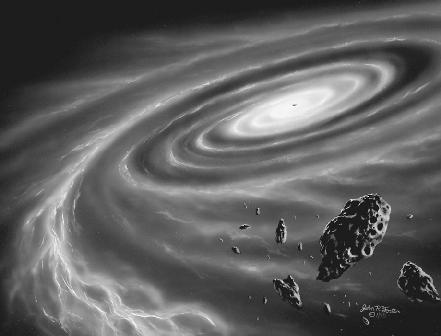Introduction
Facing the Ultimate Unknowable
The concept of black holes consistently grips the human imagination. Many strange and frightening creatures and objects have been invented in mythology and fiction, and modern scientists have revealed a number of equally bizarre and disquieting things in the natural world. But none of these quite compares to the idea of the black hole—an object whose gravitational pull is so great that even light cannot escape it, and a place where most of the normal laws of nature break down. In the words of noted physicist Kip Thorne, one of the world's leading experts on black holes:
Of all the conceptions of the human mind, from unicorns to gargoyles to the hydrogen bomb, the most fantastic, perhaps, is the black hole: a hole in space with a definite edge into which anything can fall and out of which nothing can escape, a hole with a gravitational force so strong that even light is caught and held in its grip, a hole that curves space and warps time.
To many people, the very idea of such a cosmic monster on the loose seems like something out of a science fiction novel or movie. And yet, says Thorne, "well-tested laws of physics predict firmly that black holes exist. In our galaxy alone there may be millions." 1
Mysterious Monsters
In spite of the possibly large number of black holes lurking out there, however, these strange objects are far from easy to observe and study. Thorne admits, "Their darkness hides them from view. Astronomers have great difficulty finding them." 2 This elusiveness imparts to black holes an air of mystery. And indeed, one reason they are so fascinating to so many people is that they are exceedingly mysterious objects. Because even light is trapped inside them, cutting them off from the visible and tangible parts of the universe, they are dark, foreboding, and in some

ways frightening. Most importantly, what lies inside black holes, no matter how hard humans try to theorize about it, is ultimately unknowable. As eminent scholar John Taylor, of King's College, London, puts it:
Ever since humans began to think, we have worshiped that which we cannot understand. As millennia have passed, we have understood an ever-increasing amount about the world around us…. Yet we are now in a position of facing the ultimate unknowable, which can never be penetrated as long as we remain in our present physical form. The ultimate unknowable is the black hole. However hard we may struggle, we will never be able to get out of this most fearsome object of the heavens once inside it. Nor can we ever find out what is happening in its interior if we stay outside, fearing to make the one-way trip. 3
Why Study Black Holes?
If black holes are so mysterious and in many ways unknowable, it is only natural for the layperson to wonder if they are worth studying at all. Would it not make more sense for astronomers to spend their time, energy, and money pursuing more practical endeavors? The answer to this question is a resounding no. More and more evidence suggests that black holes are intimately connected to many of the most fundamental processes of the universe. First, these objects are manifestations of ordinary gravity working overtime, so to speak. Gravity is the force that holds the universe together, and the more that scientists can learn about gravity, the better they can explain the origins and structure of the universe. "A strong motivation for searching for black holes," physicists Mitchell Begelman and Martin Rees write, "is that they represent objects where gravity has overwhelmed all other forces, allowing one to test theories of gravitation under the most extreme conditions." 4
Among the other reasons that scientists are eager to learn more about black holes is the fact that many of these objects evolved from ordinary stars. Understanding how black holes form from stars tells much about the final stages of stellar evolution. (The term "stellar" refers to stars.) Also, increasing evidence points to the possibility that the evolution of galaxies—large swirling masses made up of billions of stars—may be inexorably tied to the formation and life cycles of gigantic black holes occupying their central regions.
In addition, scientists now believe that black holes may contain important clues to the nature of the relationship between space and time, that is, between the familiar three-dimensional world and the fourth dimension—time. Scientists often refer to the interaction of space and time as "spacetime." Near black holes, "spacetime behaves in peculiar and highly 'non-intuitive' ways," Begelman points out:
For instance, time would "stand still" for an observer who, managing to hover or orbit just outside the horizon [the outer edge of a black hole], could then see the whole future of the external universe in what, to him, was quite a short period. Stranger things might happen if one ventured inside the horizon…. Our uncertainty about the "interior" of black holes doesn't reduce our confidence in predicting their astrophysical consequences [effects on the universe around them]. As an analogy, there are many mysteries deep inside the atomic nucleus, but this realization doesn't prevent physicists from calculating the properties of atoms. 5
Thus, black holes seem to be closely connected to many of the basic properties and processes of the universe. Evidence shows, for example, that gravity,

stellar evolution, the formation of galaxies, and the effects of time on space (and vice versa) are all associated in various ways with these cosmic monsters. And the search for answers to the many riddles of black holes is opening up an exciting new chapter in the ongoing saga of science.
but still, i think black holes, the universe etc. is such an important part of peoples lives and to not study it would be difficult for us.
I personally think it's frightning and overpowering, but i am so intruiged to the point where i will read about black holes until i cry.
I believe there is so much left to learn about the universe, and we are at the very first stage of figuring out how it all works, and i dont believe that we are never going to know how this universe works. I truly think that one day, a long time from now, people will know, and i am scared to think about how life will have changed in that long time from now.